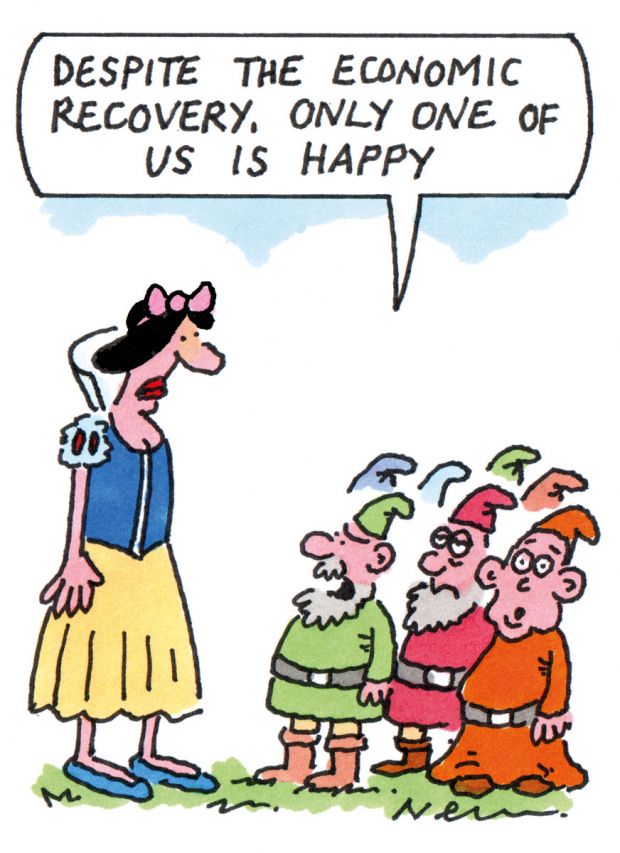
- Any economic recovery is apparently unlikely to make Britons happier. The Daily Telegraph reported on 28 November that Eugenio Proto, associate professor of economics at the University of Warwick, had found that national populations’ happiness levels do not increase once gross domestic product per capita exceeds $36,000. The paper noted that the UK records almost exactly that figure: £22,244. A paper Dr Proto co-authored in the journal PLoS ONE also found that richer nations than the UK, such as the US, Germany and Sweden, had slightly lower levels of happiness owing to “the associated increased pressure of ‘keeping up with the Joneses’”. Vice-chancellors, some of whom earned in excess of £400,000 in 2011-12, must be as miserable as sin.
- The Daily Mail is not known for its sympathetic treatment of social workers or single mothers, but it seems an exception can be made when it presents an opportunity to have a go at Jobcentre staff. The paper reported on 26 November that an unemployed single mother had been advised by her local Jobcentre to delete any reference on her CV to the degree in social work that she had earned from the University of Portsmouth. The woman, Rachel Sawford, “escaped an abusive relationship” to earn the qualification, but Jobcentre staff warned her that it might “scare off” potential employers from outside her field. Ms Sawford, who has student debts of £30,000, was not impressed. She told the paper: “They are saying everything I have achieved in the past four years is worthless. I want to get off benefits but I will not take my achievement off my CV.”
- The London School of Economics is also on the market for an income boost. On November, law firm Pinsent Masons announced that it was advising the institution on a £125 million bond issue. A couple of years ago, bonds were touted as the great white hope for universities’ capital programmes in the age of austerity, but only three – De Montfort University and the universities of Cambridge and Manchester – have taken the plunge. Why the LSE has decided to join them is unclear but, after getting its reputational fingers burned by its connections to former Libyan dictator Mu’ammer Gaddafi, it may feel that chasing philanthropy poses a greater risk than committing to pay investors a steady rate of return.
- The reputation of eminent evolutionary biologist Robert Trivers took a hit in 2005 when he co-published a paper in the journal Nature claiming that men with more symmetrical bodies were rated better dancers. The paper was questioned at the time and two years later the Rutgers University professor began to have doubts of his own after finding alleged inconsistencies in the data used by lead author William Brown. Dr Brown, then a postdoctoral researcher and now senior lecturer at the University of Bedfordshire, denies any wrongdoing. Since then Professor Trivers has been battling publicly to convince a reluctant Nature to retract the paper. His zeal even led to his being banned from the Rutgers campus for five months in 2012 after a heated discussion with Lee Cronk, a fellow author on the paper, about the case. The Retraction Watch website reported on November that Nature’s resistance had finally been overcome after the conclusion of a Rutgers investigation. But Professor Trivers is not exactly dancing – symmetrically or otherwise – in the street. He told the site he is frustrated that the retraction notice contains no explanation of what went wrong. Bedfordshire has agreed to look again at the case.
- As university staff held a second one-day national strike on 3 December, Sally Hunt, general secretary of the University and College Union, said the unions would fight on to “stop the pay cuts”. In a statement to members on 2 December, Ms Hunt says she has received “letter after letter from members whose pay levels mean they are struggling to make ends meet”. Staff are struggling to stay on top of mortgage payments, pay bills and feed their families, while casualised workers are worried about having enough work, she says. Unions claimed the strike would cause “widespread” disruption, but the Universities and Colleges Employers Association said a “low turnout” had resulted in “minimal impact” on students.
Register to continue
Why register?
- Registration is free and only takes a moment
- Once registered, you can read 3 articles a month
- Sign up for our newsletter
Subscribe
Or subscribe for unlimited access to:
- Unlimited access to news, views, insights & reviews
- Digital editions
- Digital access to THE’s university and college rankings analysis
Already registered or a current subscriber? Login
